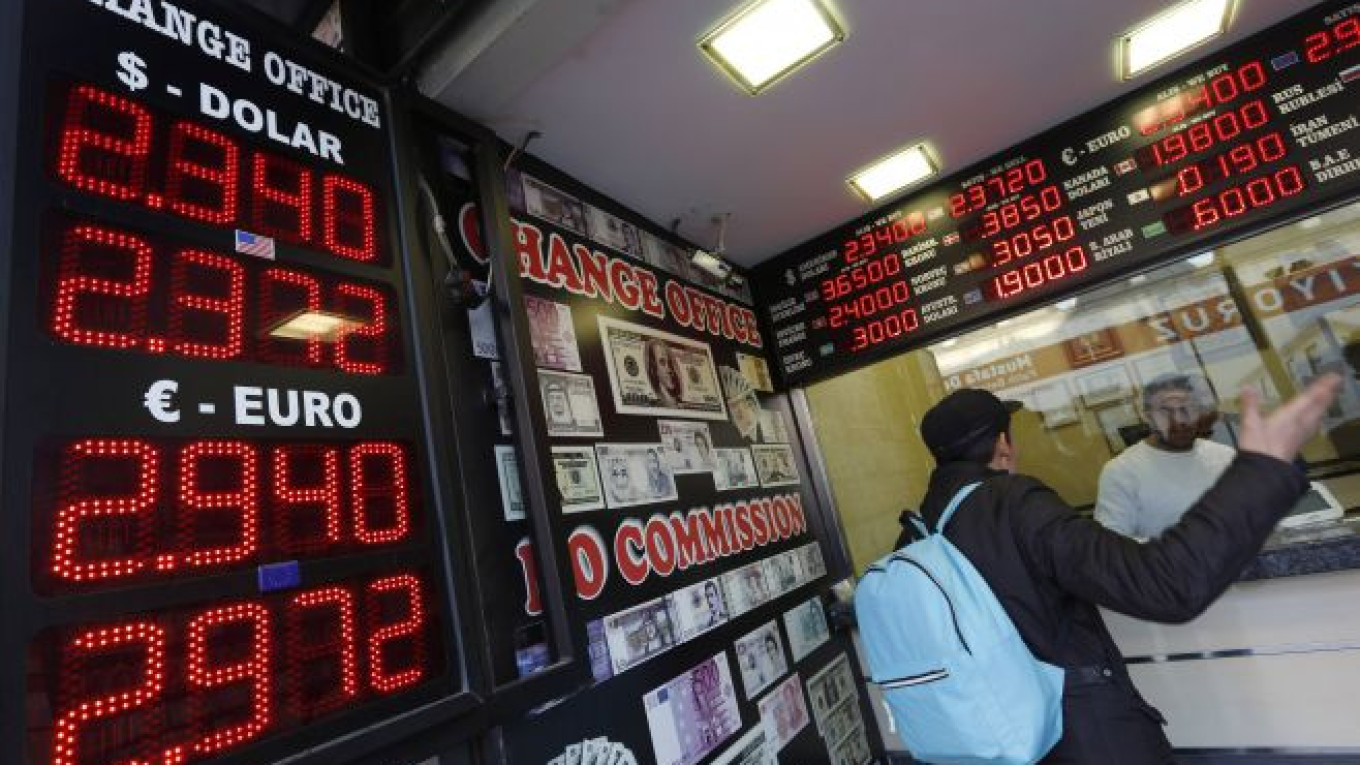The official exchange rate was still in the 60s, and the sign on the currency exchange kiosk's door said there were U.S. dollars on sale at 80 rubles. The woman at the window wanted 85.
At the exchange points that are a fixture across the Russian capital, those in need of dollars to protect their savings from the ruble collapse were forced to pay more than 20 percent above the plunging official exchange rate on Tuesday.
A shock overnight interest rate hike failed to rescue a currency driven sharply lower by falling oil prices, the threat of recession and economic sanctions imposed over Ukraine.
For the first time since the catastrophic 1990s, currency exchange points were updating their signs hourly to match pace with the ruble's fall, and there was no guarantee they would offer dollars at the price on the door.
"I can't keep up, changing the rates advertized. Things change every minute. People come and take whatever anyway. No one wants to be left with rubles now," said a worker at one currency exchange point who declined to be identified.
"We have dollars but there is no point in selling them cheap now: we'd be making losses soon. We don't want to be left with rubles either."
Spreads at currency exchange points — usually no more than a percent or two above the official rate — widened throughout the day even as the rate fell at its fastest pace in 16 years.
The last rouble crash in 1998 wiped out the financial system and helped propel Vladimir Putin to power. Currency stability had until now been the hallmark of his 15-year rule.
It is not clear how hard the savings of ordinary Russians will be hit this time around: many already kept their savings in hard currency after the turmoil of the 1990s. Others have switched to dollars in recent months while the Central Bank was spending billions buying up rubles to stave off the crash.
Among those hard hit are middle class Russians who under Putin have increasingly studied and vacationed abroad. Tamara, a lawyer with a daughter at university in Malta, said she could now afford only four more months tuition.
"Back in 1998 I was younger, now it's much more difficult for me. But I hope we will live through this all the same, it's scary but what can we do?" she asked.
The price of dollars on Moscow's streets is already around triple the price at the start of the year and half again more than the price last week.
So far, the situation has not reached the panic point of 1998, when the government defaulted on domestic debt and many banks delayed payments to depositors, who gathered in unruly crowds. At the peak of the crisis then, exchange points stopped offering dollars at any price, putting up signs saying "dollarov nyet".
But even if full-blown panic has not set in, people said they expect harder times ahead.
"We have not yet raised prices but it looks unavoidable. I guess we'll do it as of New Year. I'm bracing for a repeat of 1998," said Alina Korshunova, a manager at a restaurant serving Uzbek food in central Moscow.
"Usually, we would have December full of end-year corporate events. Now even this has dried up. That's what happens when the whole country has nothing but oil. I hope we won't have to lay off staff," she said.
Olga, an architect in her fifties walking out of a bank, said she had long ago lost faith in financial institutions.
"The problems have been growing for a long time now. I don't think this whole Ukraine affair is the reason really," she said. "The rich have no idea how the poor live, corruption is rife, and all public contracts are fixed. It just had to crash."
A Message from The Moscow Times:
Dear readers,
We are facing unprecedented challenges. Russia's Prosecutor General's Office has designated The Moscow Times as an "undesirable" organization, criminalizing our work and putting our staff at risk of prosecution. This follows our earlier unjust labeling as a "foreign agent."
These actions are direct attempts to silence independent journalism in Russia. The authorities claim our work "discredits the decisions of the Russian leadership." We see things differently: we strive to provide accurate, unbiased reporting on Russia.
We, the journalists of The Moscow Times, refuse to be silenced. But to continue our work, we need your help.
Your support, no matter how small, makes a world of difference. If you can, please support us monthly starting from just $2. It's quick to set up, and every contribution makes a significant impact.
By supporting The Moscow Times, you're defending open, independent journalism in the face of repression. Thank you for standing with us.
Remind me later.


